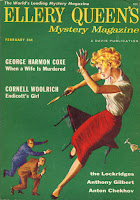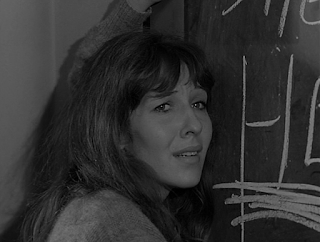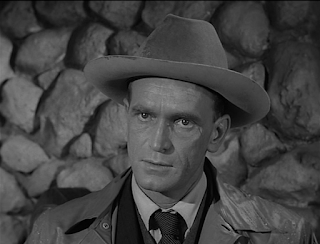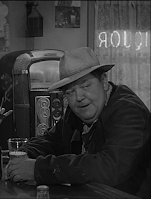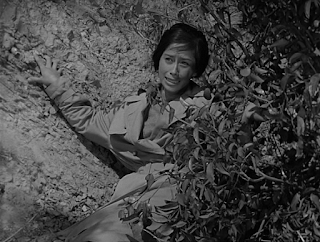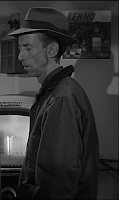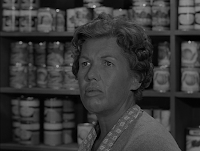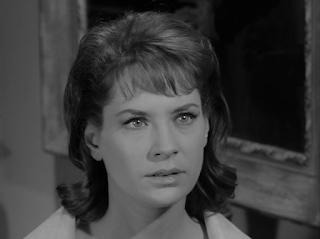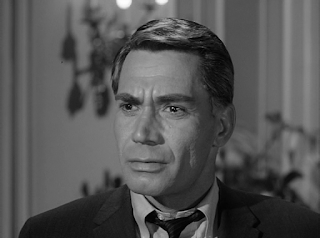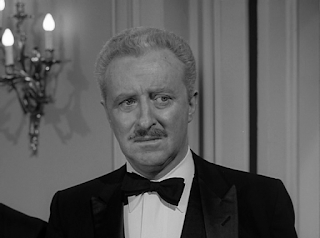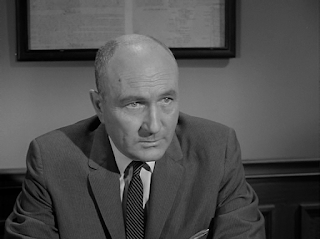by Jack Seabrook
William Douglas Gordon (1918-1991) earned a degree in theatrical arts from UCLA, began writing for radio in 1936, and directed some very early TV shows starting in 1939. He served as an infantry officer in WWII and then joined the Los Angeles Repertory Company after the war. He began acting in TV shows in 1958 and continued acting until 1986; he was seen in 13 episodes of Riverboat in 1959 and he also appeared in two episodes of The Twilight Zone and one episode of Thriller.
In addition to acting, Gordon began writing for TV in 1960, scripting numerous shows until 1981, including Thriller, The Fugitive, and The Alfred Hitchcock Hour. He also served as story editor or story consultant for several series, including The Fugitive. Gordon directed a couple of TV shows and produced 32 episodes of The Fugitive and 47 episodes of Twelve O'Clock High.
Gordon wrote or co-wrote six teleplays for
The Alfred Hitchcock Hour; the first was "Bonfire," which is credited to him and Alfred Hayes. That episode is discussed
here. His second teleplay was "The Lonely Hours," based on a novel called
The Hours Before Dawn.
* * *
Celia Fremlin's novel, The Hours Before Dawn, tells the story of Louise Henderson, a young mother with three children: eight-year-old Margery, seven-year-old Harriet, and Michael, a baby boy who cries incessantly every night and keeps her from sleeping. Louise and her husband Mark rent an upstairs room to a new tenant, a fortyish schoolteacher named Vera Brandon. After she moves in, she takes an interest in the baby and engages Mark in conversation about the Greek myth of Medea; Mark feels like he's met her somewhere before.
One afternoon, Louise's mother visits and wants to collect some books that had been left in Vera's room. Thinking that Vera is out for the day, Louise enters her room only to find the tenant sitting quietly by the window. Late one evening, Louise hears Michael crying for his feeding. She also hears someone walking upstairs and thinks one of her daughters is out of bed, but when she goes upstairs they are fast asleep. Later that night, Vera awakens to Michael crying again. She takes him to the scullery to feed and quiet him so that Mark and Vera will not be disturbed. Her exhaustion continues to mount and she oversleeps in the morning; she has to rush the girls to school and her neighbors complain about her baby's crying.
Mark comes home unexpectedly for lunch and suggests going to the movies. Louise balks at his suggestion that they ask Vera to babysit, so they ask Mrs. Hooper, who brings her son Tony along. At the movies, Mark and Louise run into Beatrice and Humphrey; Beatrice asks if Vera Brandon got in touch with them, since she had asked Humphrey for Louise's address when they met at a work function. Louise wonders why Vera asked about them before answering their ad for a boarder. She returns home to find Mrs. Hooper gone and Tony watching the baby. He tells her that Vera is a spy and says that he saw her looking through papers in Louise and Mark's desk. He recalls that she once came to his house and looked through the desk there as well.
 |
| Nancy Kelly as Vera Brandon |
Louise decides to make inquiries about Vera, who says that she is going to Oxford for the day to give a talk. Vera departs loudly but Louise later begins to suspect that she never left the house and is once again sitting quietly in her room. Hoping to enlist Beatrice's aid in investigating Vera, Louise invites her and Humphrey to dinner. Humphrey can't recall if Vera had asked him for Louise or Mark's address; Vera returns home and denies it. Louise feels confused and exhausted. Waking again at two a.m. to feed the baby, she puts him in his pram and walks the streets until she sits down on a park bench. She falls asleep and awakens near dawn to find baby and pram gone.
Louise goes to the police station, only to discover that baby and pram are safe at home. Later that day, Louise finds out that her daughters have been copying passages from Vera's diary, which they call a Spy Book; Vera keeps it hidden in a cupboard but the girls can reach it from the attic through a hole in the ceiling. Louise reads the passages that the girls have copied and finds two addresses. She telephones one and speaks to Frances Palmer, who says she did know Vera and agrees to meet.
 |
| Gena Rowlands as Louise Henderson |
Mrs. Palmer's house is immaculate and she displays none of the signs of exhaustion that have become so familiar to Louise. She recalls Vera turning up one day last fall, claiming to be answering an ad for a housekeeper although none had been placed. That evening, Frances thought she glimpsed Vera standing in the shadows of her bedroom. Frances ran for her husband, but when they returned to the room, it was empty. Frances suspects that Vera is a criminal. Louise visits the other address from the diary and meets a poor woman with five children; the woman can't recall if she ever met Vera. Louise returns home to find that Mark is upstairs talking with the tenant. Beatrice telephones to tell Louise that she has learned that there was some sort of scandal involving Vera at school the prior summer.
One evening, Louise and Mark take the children to the fair. Mark disappears into the crowd and Louise goes on a ride with the girls, leaving Michael sitting alone in his pram. When the ride ends, Michael and his pram have again disappeared. After frantically searching for the child, Louise goes home, certain that Mark has him. However, Mark is home without the baby, who is soon located at the Lost Children tent at the fair.
After the excitement dies down, Louie looks up the myth of Medea, who murdered her children in a fit of jealousy. Louise resolves to read Vera's diary, so she crawls into the attic and retrieves it from its hiding place in the cupboard. Louise reads that Vera became pregnant by a fellow teacher, whose negative reaction caused Vera to become consumed with her secret pregnancy. Tragedy struck when the baby was born prematurely and died. Vera refused to accept what had happened to her son, whom she named Michael, and soon she became convinced that the baby had been stolen by another mother. In the months that followed, Vera tracked down the babies of other women in the same hospital ward, finally settling on Louise's son as her own stolen child. Vera hates Louise and plans to take the baby soon.
 |
| Joyce van Patten as Grace Thorpe |
Time gets away from Louise, who suddenly senses that Vera is in the room below her. Louise rushes downstairs to her baby's room and finds him safe. She goes to bed and awakens at two a.m. to hear him crying. She takes the baby to the scullery to feed him and falls asleep, awakening with a start to realize that someone has left the gas on at the stove. Vera confronts her; she has drugged Mark and intends to hold Louise down until she perishes from gas poisoning. Suddenly, there is an explosion--the pilot light ignited the gas. Louise and Mark rescue the children and make their way outside to safety; Vera appears in the attic window, struggling with a bundle of bedclothes before falling backward into the flames.
The truth comes out about Vera and life returns to normal for Louise, who has a faint hope that her baby may begin to sleep through the night.
The Hours Before Dawn was published in 1958 and deservedly won the Edgar Award for best mystery novel of the year. It is a cleverly-plotted, well-written story that is told from the perspective of an exhausted young mother. Louise is the story's detective, gradually piecing together the mystery of Vera Brandon. Vera is both villain and tragic figure, a woman whose despair at losing her baby drives her to obsession and attempted murder. The novel is filled with characters who offer opinions and make judgments about the right and wrong ways to raise a child. Louise is a detailed portrait of a woman nearly driven mad by fatigue, a condition seemingly invisible to those around her. Clues are planted throughout the novel as to Vera's motives and goal; the fiery conclusion recalls the end of Mrs. Danvers in Hitchcock's Rebecca.
The novel is available to read online
here.
* * *
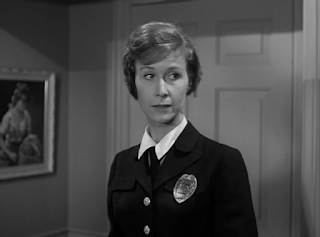 |
| Alice Backes as the policewoman |
Celia Fremlin Goller (1914-2009) was born in England and educated at Oxford. She worked as a researcher for the Mass Observation Project, a group of observers and voluntary writers who studied the lives of ordinary people in Britain beginning in 1937. Fremlin's first book, published in 1939, was The Seven Chars of Chelsea, about the lives of charwomen in London. The Hours Before Dawn was her first novel, published in 1958, and she said that she wrote the book at night after pushing her own baby around London and losing sleep. The experience led her to imagine a book about parental sleeplessness and The Hours Before Dawn was the result.
Fremlin went on to write more than a dozen novels in the ensuing decades and she had over two dozen short stories published in Ellery Queen's Mystery Magazine between 1967 and 1999; some of her stories were collected in two books. Several of her works were adapted for television, including five German TV films made between 1986 and 1997.
* * *
The Hours Before Dawn was first adapted for TV as a live broadcast on the U.S. Steel Hour. The show aired on September 23, 1959, and starred Colleen Dewhurst as Vera, Mark Richman as Mark, Teresa Wright as Louise, and Jack Carter as another character. Philip Lewis wrote the teleplay. This live broadcast appears to be lost.
The second TV adaptation of Fremlin's novel was titled "The Lonely Hours" and aired on The Alfred Hitchcock Hour on CBS on Friday, March 8, 1963. William D. Gordon wrote the teleplay.
The third TV adaptation of The Hours Before Dawn aired on German TV on March 24, 1997, with a teleplay by Wolf Gremm. The German title, "Die Stunden vor dem Morgengraun," translates into English as "The Hours Before Dawn."
* * *
 |
Baby Lonnie is the
only male cast member. |
The first thing that becomes apparent when watching "The Lonely Hours" is that the central concern of the novel, parental sleeplessness, has been jettisoned. Louise Henderson may be at home with her children, but she looks perfect: in the first scene, she is fixing something in the kitchen and wears a sleeveless dress and high heels. Her hair is flawless. The second surprise comes when the telephone rings and it's her husband calling long distance. He is away on a business trip and will be gone for another week, which means that Mark, a major character in the novel, is absent from the TV show. In fact, as the show unfolds, there are no male characters at all, other than the uncredited little boy who plays Louise's son and a couple of men who pass by on the street. In crafting a show with an all-female cast, Gordon makes an interesting choice that serves to set the events of the story completely in the world of women. According to The Alfred Hitchcock Presents Companion, the idea of telling the story with an all-female cast originated with Joan Harrison.
Vera appears at the door and the children admit her while Louise is still on the phone; the visitor walks in and immediately begins to rearrange the environment by turning off a record player before she sees Lonnie, the baby boy who will be the object of her obsession. Louise greets her and asks if they've met before; Vera denies it and says she is there about renting a room. Louise remarks that they had been thinking about taking on a boarder and Vera explains that someone at the university must have mentioned it. After a quick look at the room, Vera agrees to rent it for $30 a month.
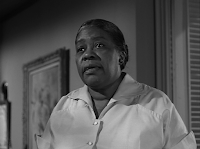 |
| Willa Pearl Curtis as Katie |
In the scene that follows, Vera pulls up in front of a different house and carries a bassinet wrapped in blankets into an apartment that she is renting under the name of Mrs. J.A. Williams. (We may only see women in "The Lonely Hours," but they are still known by their husbands' names!) It seems clear that the bassinet does not contain a real baby and, when the landlady, Miss McGuinness, knocks on the door, Vera seems apprehensive. She pretends that the baby, whom she calls Michael, is sleeping, and she accepts a toy that the landlady brings that came in the mail. Miss McGuiness is surprised to learn that Vera plans to stay at least another month, and Vera lies and says that she and the baby will be staying with a friend from college for a few days. Vera puts the toy next to the bassinet and the baby is revealed to be a doll.
In contrast to the novel, the early scenes of "The Lonely Hours" make it clear to the viewer that Vera is, at the very least, deranged, and perhaps dangerous. She lies to Louise about how she learned that a room was for rent, she lies to the landlady about her plans, and she carries around a doll to make it look like she has a baby. In the novel, Louise only begins to suspect that there is something wrong with Vera gradually, and for much of the book the reader is uncertain as to just what is going on. This is not the case in the TV show.
 |
| Juanita Moore as Mrs. McFarland |
Back at the Henderson house, Louise chats with her friend Grace, who takes the place of the novel's Beatrice. Vera arrives, suitcase in hand and, in a telling moment, explains the topic of her doctoral dissertation to Grace, who looks on blankly and then turns and invites Louise to a "'fashion tea.'" Vera is portrayed as a slightly older, educated woman, who does not fit in among the vapid suburban housewives. Vera happily agrees to babysit Lonnie and goes upstairs alone but, instead of going into her own room, she enters the baby's room, calls the baby "'Michael,'" and tells him, "'It's all right... I'm here now... I'll never leave you.'"
In the morning, at breakfast, Louise's daughters discuss their belief that Vera is "'a spy... a secret, atomic spy,'" but this remark is passed off as childish fun because Vera is standing next to the table and gives the girls a knowing look. Louise leaves to take the girls to school and attend the fashion tea, and Vera is left alone with baby Lonnie, whom she immediately picks up and calls Michael. Vera drives the baby to her other home and this time there is no need to cover him with blankets, since he has transformed from doll to human. Miss McGuinness remarks that the baby is "'just the image of you,'" to Vera's delight. Inside her apartment, Vera takes the baby into the nursery that she has prepared for him. She is gentle and loving with the boy, making her actions all the more pathetic and frightening.
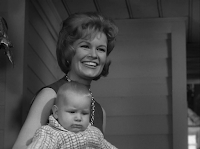 |
| Jackie Russell as Sandra Mathews |
That afternoon, Louise returns to a quiet house, and the camera looks up at her from below to increase the unease she feels as she calls for her children. The viewer suspects that Vera has taken Lonnie away for good, but this is not the case--Louise runs upstairs and finds her son resting quietly under Vera's supervision. Louise is slightly uncomfortable when she finds a new toy in Lonnie's crib and Vera admits that she bought it for him. At night, Louise is reading in bed when she hears Lonnie crying. She goes to his room to find Vera holding him and walking back and forth, trying to comfort him. Louise gives Vera a quick lesson in parenting and Vera is not happy.
Eventually, Louise begins to suspect Vera after the girls again insist that she's a spy and reveal that she has a little book in her room with men's names in it, including that of Louise's husband. Louise now has Katie, a black woman, watching the baby, presumably because she no longer trusts Vera, and Vera overhears that Mark will be home in a couple of days. However, after going out for several hours, Louise returns home to find that Katie has allowed Vera to take Lonnie out shopping with her. Vera is upset, explaining that she hired Katie because she did not trust Vera alone with the baby, but when Vera returns with the baby and a gift for Louise, Louise appears to reconsider her distrust of her boarder.
 |
Mary Adams
|
Louise sneaks into Vera's room and looks at her little black book, tearing out a page that has the addresses of three men, including Mark. This takes the place of the novel's scenes where the children copy passages from Vera's diary and Louise begins to grow concerned when she suspects Vera is writing about Mark. Louise visits Sandra Mathews, a gum-chewing young mother who recalls that Vera came when her baby was three months old to try to sign him to a modeling contract. Coincidentally, both baby boys are seven months old, but Robbie--Sandra's child--is blond. Louise visits the wife of the second man on the list, but this mother--whose son is also seven months old--is black. This woman remarks that she had her son at St. Dominic's Hospital, which is where Louise gave birth.
Louise visits the hospital, where she asks a nun if she remembers Vera Brandon, but the nun recalls that Vera's name was Williams (the name she uses at her other residence). The nun looks up Vera's file and recalls that "'Her husband had deserted her and her baby died. Poor little thing was premature.'" At home that evening, Louise speaks to Mark on the phone and explains that she wants Vera to leave. Vera surprises Louise by telling her that she has decided to move out the next day and, when Louise goes into the kitchen to fix Vera a cup of coffee, Vera drugs Louise's cup. Instead of the violent climax of the novel, where Vera tries to murder Louise with gas, in the TV version she merely drugs Louise so that she can take the baby and leave. What follows is an extended monologue by Vera, as Louise lies on the couch in a drugged stupor.
 |
| Jesslyn Fax as Miss McGuinness |
Louise explains that she thinks the baby is really hers and tells Louise all of the details that Louise reads in Vera's diary in the novel. The effect of having Vera explain everything to a groggy Louise is less suspenseful and dramatically awkward. It is also less of a surprise, since by this point in the TV show the viewer has figured out most of what happened. Unlike the novel, where events happen very fast from the revelation of the diary to the attempted murder and the fire, the TV version has Louise awaken the next morning. She rushes to her baby's room and finds him gone.
Louise calls the police to report the kidnapping and Grace comes over to calm her friend. Louise's daughter puts on a coat that Vera left behind and the girls find a piece of paper in the pocket that is the rent receipt given to Vera by her landlady in an earlier scene--a piece of paper that has Vera's real name and address. Louise calls the police with the information and goes to Vera's apartment, where Vera patiently explains that "'Michael is not your baby.'" The two women civilly argue about who is the baby's real mother until a policewoman arrives and convinces Vera that she needs to go to the hospital to confirm that the baby is really hers.
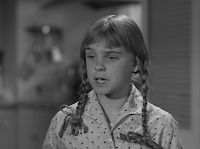 |
| Sally Smith as Marjorie Henderson |
The commotion wakes the baby and, when Vera picks him up, he is fussy and she is unable to quiet him. The scene suggests that, since Vera is not really the baby's mother, she is incapable of taking care of him. She loses her temper and yells at the child, at which point the policewoman takes him and hands him to Louise. Vera blames the baby's discomfort on the fact that he has been with Louise since birth and, while Louise comforts Lonnie, there is a shot of the creepy baby doll sitting in a playpen.
Louise emerges from the nursery holding the doll wrapped in a blanket and tells Vera that "'He's quiet now,'" at which point Vera confidently takes the doll in her arms, certain that she is able to care for it properly. Fantasy has replaced reality for this tragic figure, who is better able to act as parent to an inanimate object than to a human baby. Vera walks toward the door of her apartment, accompanied by the policewoman, and Louise returns to the nursery, where she picks up her son and holds him in her arms as the screen fades to black.
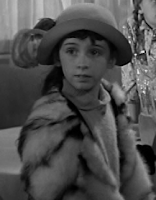 |
Jennifer Gillespie
as Celia Thorpe |
William D. Gordon's adaptation of The Hours Before Dawn is disturbing because of the portrait it paints of women and mothers in 1963. Unlike Celia Fremlin's book, which is a mystery with a violent ending, "The Lonely Hours" is much more sedate and, in the end, troubling. Vera Brandon is never violent and always seems to have the best interests of the baby at heart. Louise Henderson goes back and forth between being suspicious of Vera and patient with her, but her final act of handing Vera the doll in place of the baby is unsettling. Has Vera snapped? Does she now think the doll is a real child? There is no way of knowing. What is certain, however, is that the final scenes of "The Lonely Hours" take the story in a different direction than the novel's conclusion and make Vera's fate less certain.
* * *
"The Lonely Hours"" is directed by Jack Smight (1925-2003), who directed for television from 1949 to 1986 and for film from 1964 to 1989. Among his many films were
Harper (1966) and
Midway (1976); he also directed four episodes of
The Twilight Zone and four of
The Alfred Hitchcock Hour, including
"What Really Happened." He won an Emmy for directing in 1959.
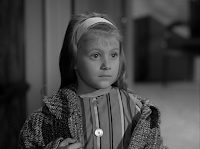 |
| Annette Ferra as Harriett Henderson |
Top billing goes to Nancy Kelly (1921-1995), who plays Vera. A child actress and model from the age of one, she appeared in films as a girl from 1926 to 1929 and then as a teenager and adult from 1938 to 1956. She worked in television from 1950 to 1963 and then again from 1974 to 1977. Kelly starred on Broadway in The Bad Seed, for which she won a Tony Award. She reprised the role in the 1956 film of the same name and was nominated for an Academy Award. The actress appeared in one episode of Thriller (with a teleplay by William D. Gordon); "The Lonely Hours" is the only episode of the Hitchcock show in which she appeared.
Gena Rowlands (1930- ) plays Louise and gives her usual strong performance. Rowlands was on screen from 1954 to 2017, often working with her husband, John Cassavetes, and she was given an honorary Academy Award in 2015. She also won three Emmy Awards and appeared in four episodes of the Hitchcock series, including
"Murder Case" with Cassavetes.
In supporting roles:
- Joyce van Patten (1934- ) as Louise's friend, Grace; she was a busy actress on TV from 1946 to 2018 and she also appeared in many films. Her TV roles included parts on The Twilight Zone, The Outer Limits, and The Odd Couple.
- Alice Backes (1923-2007) as the policewoman; after serving as a WAVE during WWII, she worked in radio and then in film from 1948 to 1978. Her busy TV career lasted from 1952 to 1997 and included roles on Thriller, The Night Stalker, and six episodes of the Hitchcock series, including "The Jar."
- Willa Pearl Curtis (1896-1970) as Katie, who lets Vera take the baby shopping while Louise is out; her screen career lasted from 1938 to 1964 and this was the only episode of the Hitchcock show on which she appeared.
- Juanita Moore (1914-2014) as Mrs. McFarland, the second woman whom Louise visits after seeing her husband's name and number in Vera's little black book; she had a six-decade career on screen from 1939 to 2001 and is best remembered for co-starring in Douglas Sirk's remake of Imitation of Life (1959). She was also in four episodes of the Hitchcock series, including "Where the Woodbine Twineth."
- Jackie Russell as Sandra Mathews, the blonde, gum-chewing young mother whom Louise visits first; her screen career lasted from 1951 to 1987 and included many TV appearances, including episodes of Thriller and The Night Stalker, as well as "Run for Doom" on The Alfred Hitchcock Hour.
- Mary Adams (1910-1973) as the nun at St. Dominic's Hospital; she was on screen from 1948 to 1971 and also appeared on The Twilight Zone.
- Jesslyn Fax (1893-1975) as Miss McGuinness, Vera's landlady; she was on screen from 1950 to 1969 and had small parts in Hitchcock's Rear Window (1954) and North By Northwest (1959), as well as on five episodes of the Hitchcock TV show, including "Coming. Mama" She was also on Batman.
- Sally Smith (1954- ) as Marjorie, Louise's older daughter; her screen career consisted of appearances on six TV episodes between 1961 and 1966, including the Alfred Hitchcock Presents episode, "A Crime for Mothers."
- Jennifer Gillespie (1954- ) as Celia, Grace's daughter; she appeared in 19 TV episodes between 1961 and 1964 and this was her only role on the Hitchcock show.
- Annette Ferra (1955- ) as Harriett, Louise's younger daughter; this was her first screen role in an acting career that lasted until 1975; she now works as a casting director under the name Chris Gilmore.
Watch "The Lonely Hours" online
here.
Sources:
"Celia Fremlin Goller." Gale Literature: Contemporary Authors, 2009, link.gale.com/apps/doc/H1000037808/CA?u=lawr69060&sid=bookmark�CA&xid=6183281f.
"Celia Fremlin Saw the Impoverished Disappointment in 1950s London." The Oldie, https://www.theoldie.co.uk/article/celia-fremlin-saw-the-impoverished-disappointment-in-1950s-london.
The FICTIONMAGS Index, http://www.philsp.com/homeville/FMI/0start.htm.
Fremlin, Celia. The Hours Before Dawn. Dover, 2017.
Grams, Martin, and Patrik Wikstrom. The Alfred Hitchcock Presents Companion. OTR Pub., 2001.
"History of Mass Observation." Home, http://www.massobs.org.uk/about/history-of-mo.
"The Hours before Dawn." Goodreads, Goodreads, https://www.goodreads.com/book/show/249870.The_Hours_Before_Dawn.
IMDb, IMDb.com, https://www.imdb.com/.
"The Lonely Hours." The Alfred Hitchcock Hour, season 8, episode 23, CBS, 8 Mar. 1963.
Price, Leah. "B-Sides: Celia Fremlin's 'The Hours before Dawn.'" Public Books, 21 July 2020, https://www.publicbooks.org/pb-staff-favorites-2017-b-sides-celia-fremlins-hours-dawn/.
Wikipedia, Wikimedia Foundation, 3 Feb. 2021, https://www.wikipedia.org/.
"William D. Gordon (1918-1991) - Find a Grave..." Find a Grave, https://www.findagrave.com/memorial/103756888/william-d-gordon.
In two weeks: Our coverage of William Gordon continues with "The Dark Pool," starring Lois Nettleton!
Listen to Al Sjoerdsma and Jack Seabrook discuss the first season of Alfred Hitchcock Presents here!
Listen to Annie and Kathryn discuss "Sybilla" here!
